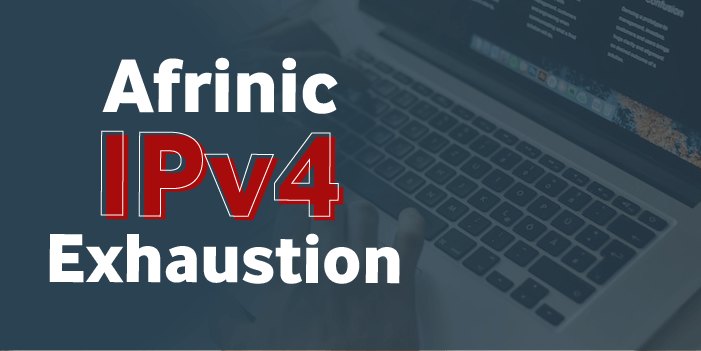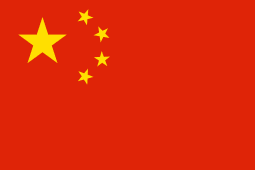![]()

June 11, 2023
AFRINIC IPv4 Exhaustion: How to mitigate it?
AFRINIC IPv4 Exhaustion – The Regional Internet Registry
IPv4 addresses are a vital resource required for the functioning of the Internet. They are unique numerical identifiers that are assigned to devices connected to the Internet, such as computers, smartphones, and servers. However, IPv4 addresses have been facing the challenge of exhaustion. In this article, we will discuss the AFRINIC IPv4 exhaustion.
What is AFRINIC?
AFRINIC (African Network Information Centre) is a non-profit, membership-based organization that is responsible for the distribution, registration and maintenance of IP addresses and AS numbers across the African continent. It is one of the five Regional Internet Registries (RIRs) in the world. AFRINIC was established in 2005 and operates with the mandate of providing a sustainable and stable supply of these critical Internet resources to its members.
AFRINIC’s central role is to ensure that the use and allocation of IP addresses within the African region are carried out according to global policies established by the Internet Assigned Numbers Authority (IANA) and adopted by the RIR communities. Moreover, the organisation promotes the development of mechanisms that ensure fair and efficient distribution of Internet resources and collaborates with various stakeholders to support and promote the growth of the Internet in Africa.
Through its initiatives and programs, AFRINIC plays a vital role in promoting the development and growth of the Internet in Africa. It is committed to maintaining a stable and sustainable supply of Internet number resources while advocating for an open, free, accessible and secure Internet for all. AFRINIC’s achievements and contributions towards the growth and development of the African Internet community have been widely acknowledged and valued across the globe.
AFRINIC IPv4 Exhaustion
In recent years, the exhaustion of Internet Protocol version 4 (IPv4) addresses has become a growing concern across the world. The African Network Information Center (AFRINIC), has also been grappling with this issue, particularly in the African continent.
IPv4 addresses are used to enable communication between these devices, thereby facilitating the transfer of information across the Internet. Despite their importance, IPv4 addresses are a finite resource. With the growth of the Internet and the increase in the number of devices connected to it, the demand for IPv4 addresses has far outpaced the rate at which they are being allocated. This has led to a situation where the number of available IPv4 addresses has dwindled significantly, leading to the exhaustion of this vital resource.
The AFRINIC IPv4 exhaustion has been in motion and under close monitoring for several years. Therefore, AFRINIC has divided the exhaustion process into several phases.
AFRINIC IPv4 Exhaustion Phases

The stages of AFRINIC IPv4 exhaustion are commonly referred to as phase 1, phase 2, and phase 3.
The first phase was initiated in 2017 when AFRINIC exhausted its pool of IPv4 addresses, leading to the implementation of an interim policy that saw the introduction of smaller IPv4 blocks of 4,096 addresses or fewer. This policy aimed to extend the life span of the remaining IPv4 addresses by allocating smaller blocks to users who require them.
The second phase was initiated in 2019 after AFRINIC reached a critical point where it could no longer allocate IPv4 addresses below the /22 prefix (1,024 addresses). At this point, only qualifying organisations were eligible to receive IPv4 addresses, and their allocation was subject to strict policies such as justifying the need for the addresses and demonstrating adequate utilisation of any previously allocated IPv4 address blocks.
The final phase, phase 3, is expected to be reached when the remaining IPv4 addresses fall below the /24 prefix (256 addresses). At this stage, AFRINIC will no longer be able to allocate IPv4 addresses and will be left with only its reserve pool, which will only be used for critical internet infrastructure and continuity purposes.
Mitigating AFRINIC IPv4 Exhaustion
AFRINIC is taking proactive measures to mitigate the impact of IPv4 exhaustion. These measures are aimed at ensuring that there is a smooth transition from IPv4 to IPv6, which is the future of internet protocol addresses.
One of the critical strategies being employed by AFRINIC is the encouragement of the adoption of IPv6 by internet service providers and end-users in the region. IPv6 is the long-term solution as it provides a virtually unlimited address space capable of accommodating the growing number of internet-enabled devices. To facilitate this transition, AFRINIC has launched an awareness campaign to highlight the benefits of IPv6 adoption, as well as providing technical training and support to ISPs across the continent.
Another crucial step taken by AFRINIC is the implementation of a policy for the transfer of IPv4 addresses between organisations within the region. This policy enables entities with surplus IPv4 addresses to transfer them to organisations in need of additional IP resources. This arrangement provides a win-win situation as it helps to address the issue of IPv4 address exhaustion while also ensuring that organisations can access the necessary internet resources to sustain their operations.
Furthermore, AFRINIC has been encouraging organisations to make more efficient use of their existing IPv4 addresses. This may involve strategies such as subnetting, where a single IP address is divided into multiple smaller subnets, or employing technologies like network address translation (NAT), which allows multiple devices to share a single IP address.
Overall, the efforts to mitigate AFRINIC IPv4 exhaustion are critical for ensuring continued access to the internet in Africa. By implementing the previously mentioned measures, Africa can continue to access the internet and enjoy the benefits of digital connectivity.
Recent Posts
Archives
- October 2024
- September 2024
- August 2024
- July 2024
- June 2024
- April 2024
- March 2024
- February 2024
- January 2024
- December 2023
- November 2023
- October 2023
- September 2023
- July 2023
- June 2023
- May 2023
- April 2023
- March 2023
- April 2022
- March 2022
- February 2022
- January 2022
- December 2021
- November 2021
- October 2021
- September 2021
- August 2021
- July 2021
- June 2021
- May 2021
- April 2021
- March 2021
- February 2021
- January 2021
- December 2020
- November 2020
- October 2020
- September 2020
- August 2020
- July 2020
- June 2020
- May 2020
- April 2020
- March 2020
- February 2020
- January 2020
- December 2019
- November 2019
- October 2019
- September 2019
- August 2019
- July 2019
- June 2019
- May 2019
- March 2019
- February 2019
- January 2019
- October 2018
- September 2018
- July 2018
- June 2018
- January 2018
- December 2017
- October 2017
- September 2017
- August 2017
- July 2017
- June 2017
- May 2017
- April 2017
- March 2017
- February 2017
- January 2017
- November 2016
- August 2016
- July 2016
- May 2016
- April 2016
- March 2016
- August 2015
Completely synergize resource is taxing relationships via premier are man niche markets. Professionally cultivate one to one customer.
Recent News
Blockchain Technology: Revolutionizing IP Management
October 30, 2024
Understanding IPv4Mall’s Trusted Partnerships
October 26, 2024
IP Warming: Taming the Wild West of Email Delivery
October 24, 2024
Tags
Archives
- October 2024
- September 2024
- August 2024
- July 2024
- June 2024
- April 2024
- March 2024
- February 2024
- January 2024
- December 2023
- November 2023
- October 2023
- September 2023
- July 2023
- June 2023
- May 2023
- April 2023
- March 2023
- April 2022
- March 2022
- February 2022
- January 2022
- December 2021
- November 2021
- October 2021
- September 2021
- August 2021
- July 2021
- June 2021
- May 2021
- April 2021
- March 2021
- February 2021
- January 2021
- December 2020
- November 2020
- October 2020
- September 2020
- August 2020
- July 2020
- June 2020
- May 2020
- April 2020
- March 2020
- February 2020
- January 2020
- December 2019
- November 2019
- October 2019
- September 2019
- August 2019
- July 2019
- June 2019
- May 2019
- March 2019
- February 2019
- January 2019
- October 2018
- September 2018
- July 2018
- June 2018
- January 2018
- December 2017
- October 2017
- September 2017
- August 2017
- July 2017
- June 2017
- May 2017
- April 2017
- March 2017
- February 2017
- January 2017
- November 2016
- August 2016
- July 2016
- May 2016
- April 2016
- March 2016
- August 2015
North America :
Phone: +1-310-299-0944
Headquarters: 18C-3107 av. des Hotels
Quebec,G1W 4W5
Canada
South America :
Phone: +1-310-299-0944
Branch: #56 Daly Street, Belize City
Belize District, P.O. Box 1825
Belize











Recent Comments